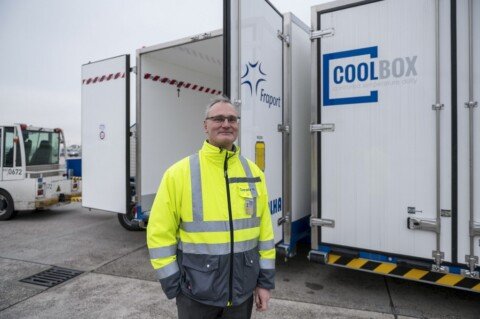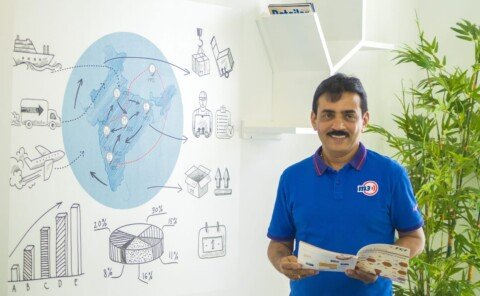As we’ve seen with COVID-19, the response speed of supply chains is critical in helping slow down and even prevent the total number of casualties in a global health emergency. In fact, according to the World Health Organisation, end-to-end supply chain and logistics systems are the foundation of successful immunisation programs. Continuous visibility along the supply chain helps minimise interruption of the flow of critical supplies and materials and improves overall response speed. By relying on software and advanced systems to source, harmonise, and streamline all of the forms of data needed into one single truth of information, companies and other entities can condense timelines and ensure product integrity. Further, with both B2C and B2B cross-border trade continuing to expand, small and medium-sized businesses (SMBs) need services that offer flexibility, visibility and affordability – giving them a better shot at competing with bigger businesses. Smart global supply chain and logistics network can offer thriving businesses the choice, convenience and control needed to take market leadership. As policymakers focus on increasing the attractiveness of local enterprises and fostering ease of doing business, global interest will likely intensify. This is set to be a major catalyst in Indian start-ups and businesses going global, demanding the urgency of strong and advanced supply chains and logistics network which becomes even more critical and able to service increasing international trade demands.
Moving the world forward by delivering what matters
In 2020, the world recognised not only the importance of supply chains but also the purpose they fulfiled. International supply chains played a bigger role than ever as companies rushed to move lifesaving medical supplies across borders and into areas of need.
UPS moves 3 per cent of the world’s GDP. We continue to forge critical connections to support the movement of not only business products between India and rest of the world but also essential commodities and healthcare materials.
Globally, vaccine distribution is a key part of moving our world forward by delivering what matters. We are pleased to support our healthcare partners with smart, orchestrated logistics, and distribution services for these vaccines that will protect communities and save lives.
Being nimble in times of emergencies
UPS India transported temperature-sensitive compounds for healthcare companies to US markets. The connectivity of the UPS network and efficiency of our solutions enabled us to assume a single carrier responsibility. To maintain product effectiveness, the shipments had to be maintained at specific temperatures. These products were moved using the UPS Worldwide Express Freight solution within our global network through the German air hub in Cologne, and then to the UPS Worldport in Kentucky, before reaching its final destination. This enabled time critical replenishment of stocks.
UPS also transported pharmaceuticals and medical aid for the Government of India to countries in Latin America.
Enabling local go global
Our focus in India is to enable commerce for local businesses, connecting them to global markets and moving such businesses and the economy forward. We are present across all key tier markets and have a deep segment focus in India across automotive, hi-technology, healthcare, manufacturing, aerospace, gems and jewellery, and garments and textiles.
The recent routing of UPS freighters to Delhi has been supporting local businesses of all sizes, especially SMBs in the global marketplace, as well as the essential sectors to meet the soaring demands.
Connect, Compete, and Change for inclusive growth
There is a focus on strengthening infrastructure, supporting micro, small and medium enterprises (MSMEs), and enhancing supply chains. Some of the allocations and announcements by the government are likely to have a positive impact on the logistics industry.
As per the Government’s recent air cargo policy, international air cargo comprises 60 per cent of the total air cargo tonnage handled in the country. The policy also seeks to make India among the top five air freight markets by 2025, besides creating air transport shipment hubs at all major airports over the next few years that will support future growth of the industry.
Growth of SMEs an important policy component
According to Directorate General of Commercial Intelligence and Statistics (DGCIS), disruptions caused by the COVID-19 pandemic have impacted MSMEs earnings by 20-50 per cent. If India has to achieve its economic potential, we have to enable commerce for the SMEs. They are one of the key economic drivers for India. Individual business growth is intrinsically tied to the overall economic growth.
While business continuity emerged as a key challenge during the pandemic, access to world markets with enhanced connectivity, and efficiency will offer competitive advantage and open up opportunities to small businesses. Now more than ever, MSMEs need the right support and partners to keep them moving forward.
UPS’s consultative approach helps us expand our customers’ businesses across world markets. Our strategy of customer first, people led, and innovation driven enables us to connect more than 220 countries across roads, rail, air, and ocean for business of any size.
IoT location services invaluable to logistics companies
Infrastructure, strong technology-backbone, flexibility in response, unparalleled customer service orientation, and the capacity to work in sync with the producer’s systems will become even more crucial now.
Innovations in technology will need to foster business efficiencies which in turn can create cost efficiencies and also support sustainability. Route optimisation is one such technology. For example, UPS’s award-winning On-Road Integrated Optimisation and Navigation (ORION) platform with dynamic optimisation recalculates individual package delivery routes throughout the day as traffic conditions, pickup commitments and delivery orders change. It provides drivers with the most efficient route for deliveries and pickups on more than 66,000 routes in the United States, Canada, and Europe. It not only generates valuable network efficiencies but also leads to fuel savings.
Strengthening the community lens in business resilience frameworks
Commerce and communities are two side of the same coin. Businesses will need to be more committed than ever because it requires a constant and collective effort to support environmental sustainability, and foster safer, healthier, and more resilient communities.
In alignment with the United Nations’ Sustainable Development Goals, UPS has committed to plant more than 50 million trees by 2030.
In India, the drive would witness planting of thousands of fruit trees, providing families with stable sources of food and a sustainable livelihood. Over the last year alone, UPS employees in India planted 606 trees and contributed 12,751 hours in volunteer hours. We now look forward to contributing to these new goals for a better, cleaner, and healthier world.







